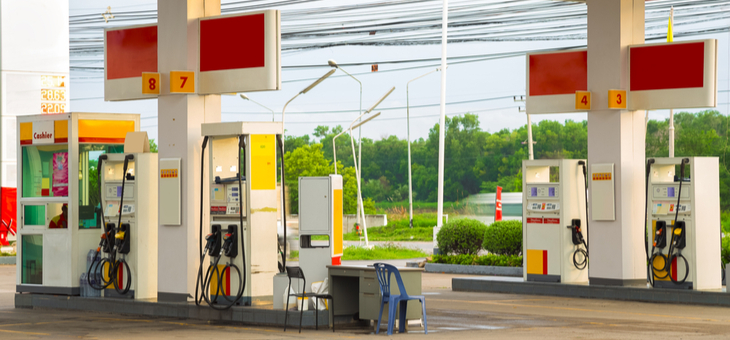Service stations can be a godsend, after filling the tank you can stock up on essential groceries, grab a hot snack, get your car washed and stretch out your legs. But they could be burning a hole in your pocket.
Petrol prices plummeted to an 18-year low in April this year, but they have been slowly recovering from the coronavirus induced fall. While there’s not a lot you can do about the increasing price of fuel, there are a few ways to save money at the bowser.
Skip the snacks
Although cigarettes are a big seller at petrol stations, bottled water is the biggest money-maker. The servo tends to make at least 50 per cent on each bottle of water, which makes it more profitable than gasoline.
It may be handy to grab snacks and groceries instead of making an extra stop on the way home, but it can come at a price. You’ll typically spend less for the same items at a grocery store.
It might help to keep track of what you tend to buy at the service station and plan ahead. If you know you always pick up a bottle of water after filling up the tank, invest in a good reusable bottle and fill it up before you head to the car.
Make use of discount vouchers
If you do your weekly shop at one of the bigger supermarkets like Coles or Woolworths, you may be able to use your receipt or rewards card to save a few cents per litre when you fill up at participating petrol stations.
Shell usually accepts dockets from Coles and Woolworths typically Caltex.
You can also look into a Costco membership which is a bulk buy store that has petrol stations. Members have access to special discounts and cheaper prices.
Use a credit card
More and more places are going cashless now, but does this mean there will be more card fraud? Avoid using a debit card at the fuel station as, if for any reason your payment information is compromised, it could take weeks for that money to be returned to your bank account. Your bank will need time to investigate the fraud before deciding on a course of action. A credit card offers greater fraud protection and you could potentially earn some points too.
Use the right fuel
Carmakers design engines for a minimum octane rating. If your car’s manual says ‘unleaded petrol only’ that means 91 octane fuel is fine. If it says ‘premium unleaded only’ you’ll need to use at least 95, and if it tells you to use 98, well that’s what you’ll have to do.
It won’t hurt your engine to use a higher-octane fuel. For example, using 95 in an engine designed for 91 octane fuel is OK. However, it doesn’t work the other way around. You can’t use a lower octane fuel than the minimum recommended by the manufacturer.
You’ll typically get either better economy or performance when using a higher-octane fuel but the improvement is usually very small and the price of the higher octane fuel often eclipses the economy benefit from running it. You’ll have to do some maths if you want to know how it works out for your specific case.
Use technology to save money
Prices per litre can differ quite drastically between petrol stations but technology can help you to keep on top of the fluctuations. There are websites and apps that allow you to search for the cheapest fuel available in your area. Some even allow you to input a route and show you the best prices along your path, so you don’t need to waste fuel going out of your way. Some of the bigger radio programs in the morning usually talk about the cheapest prices during traffic reports as well.
Plan your trips
If you can combine errands rather than venturing out separately several times a week, you could save yourself fuel and money. Plan your routes so that the total kilometres driven is reduced. Is there a grocery store on the way home from work that you can stop at rather than making an extra trip on the weekend?
Maintain your car
Service your vehicle regularly and check your tyre pressure. Even slightly flat tyres can cost you up to 6 per cent extra on your petrol bill throughout the year. Try to keep your car clean and as empty as possible, unnecessary weight can affect your gas mileage.
Some tips for fuel-efficient driving
Along with the condition of your car, the way you drive also has an impact on the amount of fuel you use. Here are some tips for fuel-efficient driving.
- Avoid short trips. Cars can use up to 20 per cent more fuel when the engine is cold.
- Avoid over-revving if you’re driving a manual. In an automatic, ease back slightly on the accelerator once the car has gathered momentum. Avoid stop/start driving when possible.
- Don’t speed. Fuel consumption increases significantly once you get over 90km/h.
- Turn off your engine when parked. Even if you’re only stopping for a short period, turning your engine off will save more fuel than you’ll lose restarting the engine. It’s not safe to turn off your engine at every red light though unless your car is programmed to do so.
- Decide between air conditioning and an open window. Air conditioning can increase fuel consumption by up to 10 per cent, but at speeds of more than 80km/h, an open window will likely cost you more in aerodynamic drag.
How often do you need to fill up your tank? Do you track fuel prices?
If you enjoy our content, don’t keep it to yourself. Share our free eNews with your friends and encourage them to sign up.
Related articles:
https://www.yourlifechoices.com.au/finance/seniors-finance/does-this-fuel-tactic-save-you-money
https://www.yourlifechoices.com.au/is-premium-fuel-worth-it
https://www.yourlifechoices.com.au/senior-drivers-buy-cars

